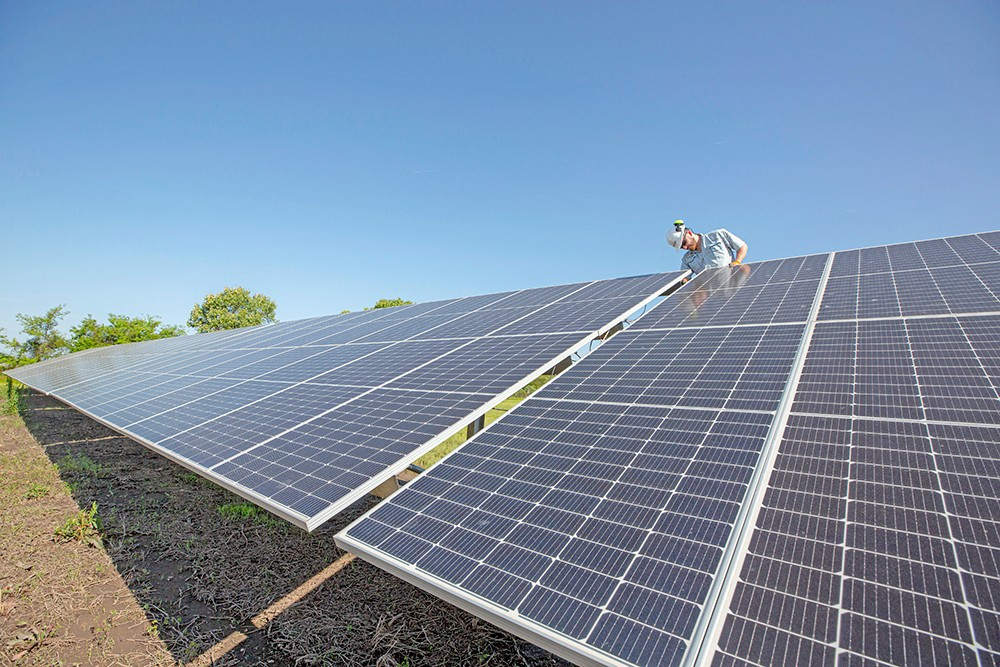By: Kyle Massey at Arkansas Business
Arkansas solar power developers and customers face a looming sunset.
After Sept. 30, 2024, state policies favorable to solar systems at homes and enterprises will change radically under recent legislation: Systems connected to the grid afterward will take longer to pay for themselves, and some will become economically impossible.
For the next 16 months, solar installation companies are expecting to stay as busy as ever, because projects connected before Oct. 1, 2024, will be “grandfathered in” until 2040 under a system that gives solar owners a credit for the electricity they put onto the grid that matches the retail rate utilities charge for power.
New systems that beat the deadline will also remain under pre-2023 rules allowing net-metered arrays to serve locations behind more than one electric meter. The biggest example is University of Arkansas System’s contract with Scenic Hill Solar of Little Rock to build 74 megawatts of capacity in perhaps the most extensive solar project ever by a public university.
Scenic Hill CEO Bill Halter expects to invest $100 million to build up to 24 solar power plants, and his company will sell all the electricity they create at a fixed price to UA System campuses.
But the changes coming in 2024 could severely crimp solar development in Arkansas, especially for companies that specialize in meter aggregation systems for farms and businesses.
CEO Douglas Hutchings of Delta Solar of Little Rock fears for his long-term business model. “Most companies in the industry will continue as normal until September of ’24,” Hutchings told Arkansas Business, predicting a boom in both residential and commercial projects as customers rush to build systems and seize the existing return on investment.
First and foremost, we’re excited to be doing all the projects we’ll be doing between now and then,” he said.
“If you start a project before the end of September 2024, then you can qualify for the grandfathering under certain situations. So the goal is to line up as much work as possible to get started before September of 2024.”
Hutchings hopes that the next legislative session, set for just months after the September 2024 deadline, will bring a return to more favorable policies. “My hope is that everyone in the industry is proactive toward the next session,” because when the policy switchover takes place, “it’s the type of projects that we do at Delta that will be very challenging.”
One concern for aggregated-meter systems is an “avoided cost” computation that comes with the new legislation, a value assigned to the marginal costs a utility would avoid if a distributed energy resource like a home solar array provided the power rather than the utility. This calculation will raise some solar owners’ electric bills and be “financially unattractive for many Arkansas consumers,” especially farmers and businesses looking to offset costs at several locations, Hutchings said.
“Under the new rules … I think residential installations will probably continue to do OK, and then the big utility-scale stuff will continue. But I think that middle section of business owners in Arkansas will not have viable opportunities to pursue solar. For folks like us, our traditional market may no longer exist, or at least not exist in a way that we’d feel comfortable selling it.”
The Arkansas General Assembly passed the legislation in March, citing arguments that the credits for solar customers are shifting utility costs to customers without their own solar energy systems. Arkansas utilities, including investor-owned Entergy Arkansas, vigorously supported the changes. Along with essentially halving the rate at which utilities credit solar owners for their excess power from an average of 12 or 13 cents per kilowatt-hour to 5 or 6 cents, the legislation also limits many larger projects for businesses, nonprofits, counties, universities and water systems.
Net metering was similarly altered recently in California (see sidebar at bottom of page), ushering in a new era in the state with by far the most small solar arrays. The new rules, established by the California Public Utilities Commission in December, decreased the credit solar owners receive by 75%. But Californians took huge advantage of a grace period, contracting for enough projects to keep solar companies busy through the end of the year.
Short-Term Sales Pitch
The grandfathering period in Arkansas offers a short-term sales pitch, said Caleb Gorden, co-founder and president of Shine Solar in Rogers, which focuses on residential systems. “It has led us to promote the urgency of going solar. But this is unfortunate as it is a step backwards for the state of Arkansas when it comes to the advancement of renewable energy.”
Lauren Waldrip, executive director of the Arkansas Advanced Energy Association, said in a telephone interview that Arkansas’ solar companies will undoubtedly adapt. She helped craft the grace period as a compromise on the net metering legislation, Senate Bill 295, with its sponsors, Rep. Lanny Fite and Sen. Jonathan Dismang.
“The solar developers are going to adjust and be fine,” Waldrip said. “Right now is kind of the best time because we finally know that grandfathering has been extended, and when the deadline will be. For folks who want solar, now is the time to do it.”
But Waldrip said many members of her trade group are businesses and organizations that developed solar as a way to economize and are sorry to see that opportunity curtailed.
Little Rock steel company Lexicon Inc., Bank OZK and Central Arkansas Water are prime examples, she said. “These kinds of organizations are the ones being impacted, losing their choices. Solar developers will implement batteries and come up with innovations.”
Cutting the value of solar power “is bad for anyone who used net metering in Arkansas,” Waldrip said.
Lexicon worked with Seal Solar of North Little Rock to build a 6,500-module solar array in Carlisle and a 4,050-panel sun plant in Blytheville built completely with Arkansas-made steel.
“Lexicon is proud to be a leader in the use of solar and other renewable energy sources in Arkansas,” President and CEO Patrick Schueck said. “Our expansive solar arrays in Carlisle and Blytheville provide nearly 70% of the energy needed to power our operations in the state, helping us reduce our reliance on non-renewable energy sources and power our plants with cleaner, greener energy.
“We know solar and other renewable energy sources are the way of the future, and that it is the right choice for Lexicon, our employees, our partners and the communities we serve,” Schueck said.
Halter, the Scenic Hill CEO and former Arkansas lieutenant governor, said his company’s deal with the UA System is “by far” the largest commercial and industrial solar project in Arkansas history.
“Scenic Hill is thrilled to partner with the University of Arkansas System, and truly congratulate them for their vision on this,” Halter said in an interview Wednesday. “We believe that over a 25-year period, after these sites are fully developed and operational, the university will save $149 million.”
Residential Challenges
Gorden, of Shine Solar, said that while business overall has been great for the past year, rising interest rates were already putting pressure on residential projects. “The net metering rules are definitely impactful … but considering these obstacles, we are focused on doing our best to always bring value to our customers according to the net metering policies that are in place. We will have to adjust our approach compared to years previous, but that is business.”
And what will be Delta Solar’s business plan if the recently adopted solar policy persists beyond 2024?
“That’s a great question,” Hutchings said, “and it’s one that will evolve between now and then. We are developing deeper expertise in storage, and we’re evaluating some opportunities around power quality applications. And we’re even trying to develop software-based approaches to enable commercial customers, which is where our passion is, to better understand and control their power usage, and thus control their costs. It can take a lot of different directions, but whatever we do, we’ll make sure it leverages our unique strengths.”


